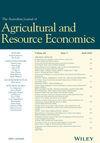环保产品折扣
IF 1.4
4区 经济学
Q3 AGRICULTURAL ECONOMICS & POLICY
引用次数: 5
摘要
理解个人对未来成本和收益的折现行为对于设计环境政策至关重要。虽然有一些经验证据表明双曲线贴现,但其他人发现,当适当考虑行为因素时,指数贴现更为准确。此外,关于环境贴现率与货币利率有何不同的研究很少。我们使用实验方法来确定个人如何贴现货币和环境产品。我们的研究结果表明,个体的折现行为近似于指数型,环境商品的折现率低于货币商品,并且在考虑适当的行为因素时,环境商品的折现率差异很大。本文章由计算机程序翻译,如有差异,请以英文原文为准。
Discounting Environmental Goods
Understanding individual discounting behavior of future costs and benefits is critical for designing environmental policy. Although there is some empirical evidence of hyperbolic discounting, others have found that exponential discounting is more accurate when behavioral factors are properly considered. Further, there is little research on how environmental discount rates differ from monetary rates. We use experimental methods to determine how individuals discount monetary and environmental goods. Our findings suggest that individual discounting behavior is approximately exponential, environmental goods are discounted at lower rates than monetary goods, and discount rates vary widely across environmental goods when accounting for appropriate behavioral factors.
求助全文
通过发布文献求助,成功后即可免费获取论文全文。
去求助
来源期刊

Journal of Agricultural and Resource Economics
社会科学-农业经济与政策
CiteScore
2.30
自引率
7.10%
发文量
0
审稿时长
>36 weeks
期刊介绍:
The mission of the Journal of Agricultural and Resource Economics is to publish creative and scholarly economic studies in agriculture, natural resources, and related areas. Manuscripts dealing with the economics of food and agriculture, natural resources and the environment, human resources, and rural development issues are especially encouraged. The Journal provides a forum for topics of interest to those performing economic research as well as to those involved with economic policy and education. Submission of comments on articles previously published in the Journal is welcomed.
 求助内容:
求助内容: 应助结果提醒方式:
应助结果提醒方式:


